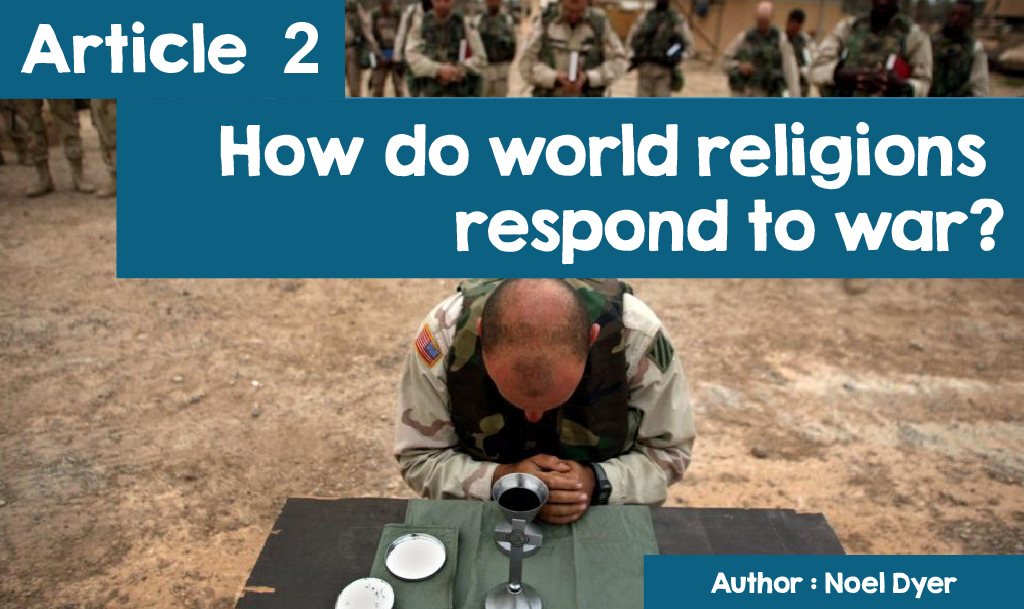Responding to WarIn a perfect world, war would not happen. Looking around the world today, and in the past, we see that warfare is constantly happening. The response of religions to war is complex and there is a difference of opinion within and across religions. |

The Effect of the British war raid on Cologne May 1942 |

|
|
On the other hand, other believers believe that using violence is always wrong. They argue that we must aim for peace and harmony and learn to work together and relate to others. For them, conflict needs to be resolved before it becomes a serious issue. Some Christians believe that they should not engage in any form of armed conflict. These people believe in pacifism - which is the belief that any form of violence or war is completely unacceptable. They say that this follows the teachings of Jesus, for example, Jesus says, 'Blessed are the peacemakers because they are called children of God' (Matthew 5: 9). Jesus teaches his followers: 'love your enemies, and pray for those who persecute you' (Matthew 5:44) and "If anyone strikes you on your cheek, turn the other to him too. " (Matthew 5:39). Even when he was arrested in the Garden of Gethsemane, Jesus prevented his disciples from defending him with force, saying, 'Put your sword back in place, for all who take the sword will die by the sword'.. A long tradition of opposing all wars has existed in Wales and this continues to the present day in the efforts of ‘Cymdeithas y Cymod’ (The Fellowship of Reconciliation. The Fellowship of Reconciliation in Wales is part of an international peace movement whose members reject war and violence on the grounds of their religion and campaign for peace. (www.cymdeithasycymod.org.uk) |

|
|
Many Christians, on the other hand, believe that one must go to war in certain circumstances when all other methods have failed. They believe that war can be justified to prevent a worse situation and to protect the innocent, but the use of unnecessary force must be avoided and ordinary people or populated areas must not be targeted. According to the Catholic Church 'While the danger of war remains ... governments cannot be denied the right to defend themselves ...... if all attempts at peace have failed'. |
The view of IslamThe term Islam means ‘peace’. The religion, the message of Muhammad and the Qur'an, emphasises peace and the need to live with others. You may have heard the word ‘jihad'. The word means 'to strive'. There are two types of 'jihad', namely the greater jihad and the lesser jihad. The biggest, and most important, jihad is the internal personal struggle against evil. Muslims must strive against every temptation to live a good life in accordance with the will of Allah; they must strive to fulfill their duties and show care for others. The lesser jihad is to fight for the protection of Islam and its people. 'Permission is given to fight those who are being attacked because they have suffered injustice .... those who have been unjustly persecuted from their homes'. However, there are definite conditions for a military jihad, for example:
For some years, we have seen the 'Islamic State' group claim responsibility for a number of horrific terrorist incidents around the world. The terrorists hold extreme religious beliefs and use violence against people who disagree with their views. On the other hand, there are a number of Islamist groups seeking reconciliation. Following an attack on a synagogue in Copenhagen, Denmark in 2015, 650 Norwegian Muslims came together to create a human circle around the Oslo synagogue so that Jews could worship on the Shabbat. |

Muslims protecting Jewish worshipers |

Sadeem Kidwai, General Secretary of the Muslim Council of Wales |
|
The Muslim Council of Wales (http://muslimcouncilwales.org.uk/about-us-welsh/) is aware of the need for collaboration between Muslims in Wales and also of the need for mutual understanding between Muslims and others in Wales. In the face of the negative picture of Islam, due to international terrorism, he wants to 'promote a true image of Islam and Muslims in Wales' to 'represent the true message of Islam and its teachings'. The Council has made consistent statements against the belligerent attacks made by ISIS (Islamic State). Sadeem Kidwai, Secretary General of the Muslim Council of Wales, said after the attacks in Paris (November 2015): “These people are criminals. They are nothing to do with Islam or Muslims. If someone is called Mohammed Ali and they say 'Allahu akbar' that does not make them a Muslim ... Your acts define your faith, not your words. The most recent attacks in Paris are an affront to humanity… This attack is claimed by the group calling themselves 'Islamic State' but there is nothing Islamic about such people and their actions are evil. They are not islamic. They are not human beings'. Imams from Cardiff mosques have come together to produce a 'What is Islam really saying' brochure to explain Islam's main messages on themes such as respect and tolerance and to challenge extremism and violence. Here is an example of the content of the brochure:
"Using terrorism to achieve political goals is forbidden in Islam, and as Muslims, we are commanded to respect the holiness of all human life. Allah says in the Holy Qur'an: 'Whoever is unjustly killed; it will be as if he has killed the whole of humanity, and whoever saves life; it will be as if they have saved the whole of humanity. '” The pamphlet can be viewed here |
The View of HinduismHinduism's message on war is reflected in the sacred texts especially the Vedas, Manu Laws and the Bhagavad Gita. Many Hindus believe that all violence and fighting in a war is wrong. This is based on the fact that every action (karma) has its consequences. However not all wars are banned in the holy books and the gods of the Vedas are praised for fulfilling their duty in war.
According to the Bhagavad Gita, Arjuna does not want to fight but Krishna explains that this is his duty as a member of the warrior class -
'Think of your duty. There is no greater honor for a soldier than to fight in a just war '.
There are rules to follow in a just war, including showing compassion for the elderly, women and children as well as those who have surrendered.
Ahimsa, on the other hand, is one of the fundamental principles of Hinduism, which is to fight against unfairness and evil without using violence. This is the principle that inspired Gandhi in the 20th century. He learned that violence was always wrong and always protested in non-violent means declaring 'An eye for an eye will make the whole world blind'.. |
End | |

The World Council of Religious Leaders logo |
|
|
In August 2000, two thousand religious and spiritual leaders of all the major religions of the world came together at a world conference in New York. They wanted to set an example for their followers and show that negotiation and cooperation can be achieved to achieve peace. 28 August 2000 was declared the 'World Peace Prayer Day' and people around the world were asked to come together to pray for peace and to show their willingness to forgive and reconcile. |


